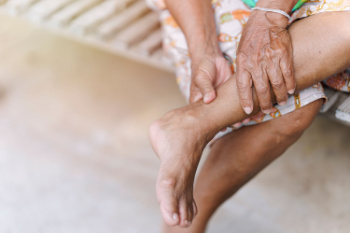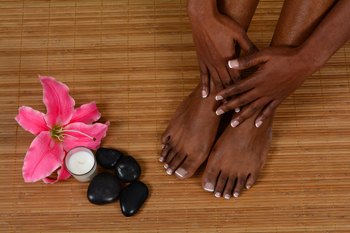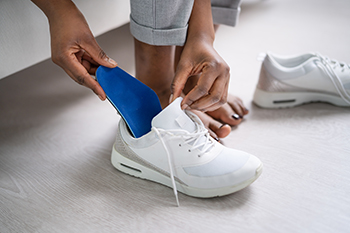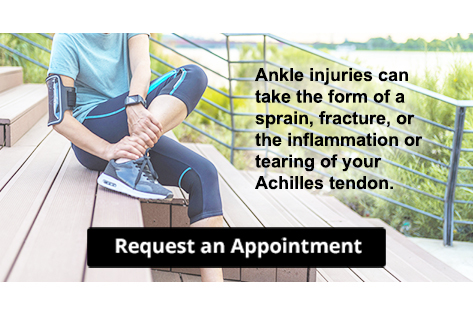Connect With Us
Blog

As one ages, the importance of foot care becomes paramount for falls prevention. Start by selecting supportive footwear with slip-resistant soles to navigate slick surfaces with confidence. Regularly inspect your feet for any signs of discomfort, changes, or potential issues that may compromise stability. Moisturize to prevent dryness, as cracked skin may lead to instability. Incorporate gentle stretching exercises to maintain flexibility, enhancing overall balance and coordination. Mindful foot hygiene, including regular washing and drying, helps ward off infections that could affect mobility. Stay vigilant in choosing appropriate footwear for different activities, ensuring a snug fit and proper arch support. By embracing these foot care practices, you can create a solid foundation for fall prevention. Falling can impact the feet, and as these practices are implemented, falling mishaps may be prevented. If you are looking for additional falls prevention techniques, it is suggested that you schedule an appointment with a podiatrist.
Preventing falls among the elderly is very important. If you are older and have fallen or fear that you are prone to falling, consult with Matthew Fillipi, DPM from Practice. Our doctor will assess your condition and provide you with quality advice and care.
Every 11 seconds, an elderly American is being treated in an emergency room for a fall related injury. Falls are the leading cause of head and hip injuries for those 65 and older. Due to decreases in strength, balance, senses, and lack of awareness, elderly persons are very susceptible to falling. Thankfully, there are a number of things older persons can do to prevent falls.
How to Prevent Falls
Some effective methods that older persons can do to prevent falls include:
- Enrolling in strength and balance exercise program to increase balance and strength
- Periodically having your sight and hearing checked
- Discuss any medications you have with a doctor to see if it increases the risk of falling
- Clearing the house of falling hazards and installing devices like grab bars and railings
- Utilizing a walker or cane
- Wearing shoes that provide good support and cushioning
- Talking to family members about falling and increasing awareness
Falling can be a traumatic and embarrassing experience for elderly persons; this can make them less willing to leave the house, and less willing to talk to someone about their fears of falling. Doing such things, however, will increase the likelihood of tripping or losing one’s balance. Knowing the causes of falling and how to prevent them is the best way to mitigate the risk of serious injury.
If you have any questions, please feel free to contact our office located in East Longmeadow, MA . We offer the newest diagnostic and treatment technologies for all your foot care needs.

Proper foot health is the cornerstone of overall well-being, laying the foundation for a life of mobility and comfort. At its core, everyday foot care involves maintaining cleanliness and hygiene, with regular washing and drying to prevent infections. It also entails the choice of wearing appropriate footwear, ensuring a balance between comfort, support, and style. Routine inspections for signs of potential issues, such as ingrown toenails or calluses, play a pivotal role in proactive foot care. A regular moisturizing routines prevents dryness and cracking, while fostering skin health. Incorporating gentle exercises and stretches into daily routines strengthens muscles and promotes flexibility, contributing to the prevention of common foot ailments. If you have developed a foot problem that causes pain or discomfort, it is suggested that you make an appointment with a podiatrist.
Everyday foot care is very important to prevent infection and other foot ailments. If you need your feet checked, contact Matthew Fillipi, DPM from Practice. Our doctor can provide the care you need to keep you pain-free and on your feet.
Everyday Foot Care
Often, people take care of their bodies, face and hair more so than they do for their feet. But the feet are a very important aspect of our bodies, and one that we should pay more attention to. Without our feet, we would not be able to perform most daily tasks.
It is best to check your feet regularly to make sure there are no new bruises or cuts that you may not have noticed before. For dry feet, moisturizer can easily be a remedy and can be applied as often as necessary to the affected areas. Wearing shoes that fit well can also help you maintain good foot health, as well as making it easier to walk and do daily activities without the stress or pain of ill-fitting shoes, high heels, or even flip flops. Wearing clean socks with closed shoes is important to ensure that sweat and bacteria do not accumulate within the shoe. Clean socks help to prevent Athlete’s foot, fungi problems, bad odors, and can absorb sweat.
If you have any questions please feel free to contact our office located in East Longmeadow, MA . We offer the newest diagnostic and treatment technologies for all your foot and ankle needs.

Custom-made orthotics play a vital role in ensuring comfortable and pain-free running for individuals over the age of 50. As we age, the natural wear and tear on our feet and lower limbs can lead to various biomechanical issues and discomfort during physical activities like running. Custom orthotics are tailored to the specific needs of individuals, making them particularly effective in addressing age-related foot problems. One of the primary benefits of custom orthotics is their ability to provide optimal support and alignment for the feet, which becomes increasingly important as people age. These orthotic devices help redistribute pressure evenly across the foot, reducing the risk of common issues like plantar fasciitis, arch pain, and joint strain. Moreover, custom orthotics can correct gait abnormalities and overpronation, which tend to become more prevalent with age. By promoting proper biomechanics, orthotics enhance stability, reduce the risk of falls, and alleviate discomfort associated with running. Custom-made orthotics are designed to fit comfortably inside running shoes, ensuring a snug and supportive fit. This added cushioning and support help absorb shock during each stride, reducing the impact on joints and minimizing the risk of injury. If you are concerned about being able to run comfortably as you age, it is suggested that you schedule an appointment with a podiatrist for a conversation about how wearing custom-made orthotics can benefit you.
If you are having discomfort in your feet and would like to try orthotics, contact Matthew Fillipi, DPM from Practice. Our doctor can provide the care you need to keep you pain-free and on your feet.
What Are Orthotics?
Orthotics are inserts you can place into your shoes to help with a variety of foot problems such as flat feet or foot pain. Orthotics provide relief and comfort for minor foot and heel pain but can’t correct serious biomechanical problems in your feet.
Over-the-Counter Inserts
Orthotics come in a wide variety of over-the-counter inserts that are used to treat foot pain, heel pain, and minor problems. For example, arch supports can be inserted into your shoes to help correct overarched or flat feet, while gel insoles are often used because they provide comfort and relief from foot and heel pain by alleviating pressure.
Prescription Orthotics
If over-the-counter inserts don’t work for you or if you have a more severe foot concern, it is possible to have your podiatrist prescribe custom orthotics. These high-quality inserts are designed to treat problems such as abnormal motion, plantar fasciitis, and severe forms of heel pain. They can even be used to help patients suffering from diabetes by treating foot ulcers and painful calluses and are usually molded to your feet individually, which allows them to provide full support and comfort.
If you are experiencing minor to severe foot or heel pain, it’s recommended to speak with your podiatrist about the possibilities of using orthotics. A podiatrist can determine which type of orthotic is right for you and allow you to take the first steps towards being pain-free.
If you have any questions please contact our office located in East Longmeadow, MA . We offer the newest diagnostic and treatment technologies for all your foot and ankle needs.




